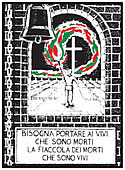The Battle of Okinawa (Operation Iceberg, 1 April -25 June 1945)
1/4/2022by Eugenio Battaglia
The Battle of Okinawa (Operation Iceberg, 1 April -25 June 1945) was the last land engagement of WWII. Ca va sans dire that as a kid I closely followed the events of the battle listening to the extremely biased news from the radio broadcasts coming out of the new Italy--lay, democratic, and antifascist--and from Radio Londra. I was a desperate fan of the Japanese.
The battle is probably well known by all but I would like to mention a few points.
The US commander on land was General Simon Bolivar Buckner Jr., a gentleman from the South. In my opinion, he should be admired for his dignified surrender offer to the Japanese, who were still holding the South of the Island but in a hopeless situation. The General died on 18 June during a bombardment. According to the spirit of the times when in Alaska he refused the arrival of African American troops, as in his opinion they would have created a bastard race of mixed blood there.
The Japanese General Mitsuru Ushijima, who refused to surrender, was a highly esteemed soldier, never accused of war crimes. On 22 June he committed suicide according to the code of Bushido.
The losses on both sides were huge, even if not exactly known but estimated. The National Park of Okinawa Senseki indicates 237,318 Japanese, of whom 140,000 were civilians including a number of suicides upon the arrival of the US troops, and 14,000 US soldiers, while 90% of the buildings and historical places were destroyed.
It is believed that the hell of the Okinawa Battle convinced President Truman to use the atomic bombs, but not on Tokyo (already badly burned with 100,000 casualties on 10 March 1945) or Kyoto, because of its historical monuments. However, Truman wrote in his diary that the nuclear bombs should have been used only on military objectives (sic!). The option to use poison gas was also considered.
(I have visited both Nagasaki and Hiroshima and their Museums.)
The use of said nuclear bombs is still controversial but also, from a certain point of view it was understandable.
The 1907 International Convention of The Hague forbids the bombardment of undefended towns. But in almost the entirety of WWII there were criminal violations of said Convention. However, we may say without fear of contradiction that the "carpet bombing" and the bombing of civilian objectives to cause the demoralization of the internal front were war crimes.
Okinawa has an area of 1415 square kilometers (the state of Rhode Island has 4002), with about 1,285,000 inhabitants. It is still occupied by a large contingent of US troops, some 18,000, in spite of the strong opposition of the local population. The large 80 square km Center of Military Training is especially hated by the Okinawans.

